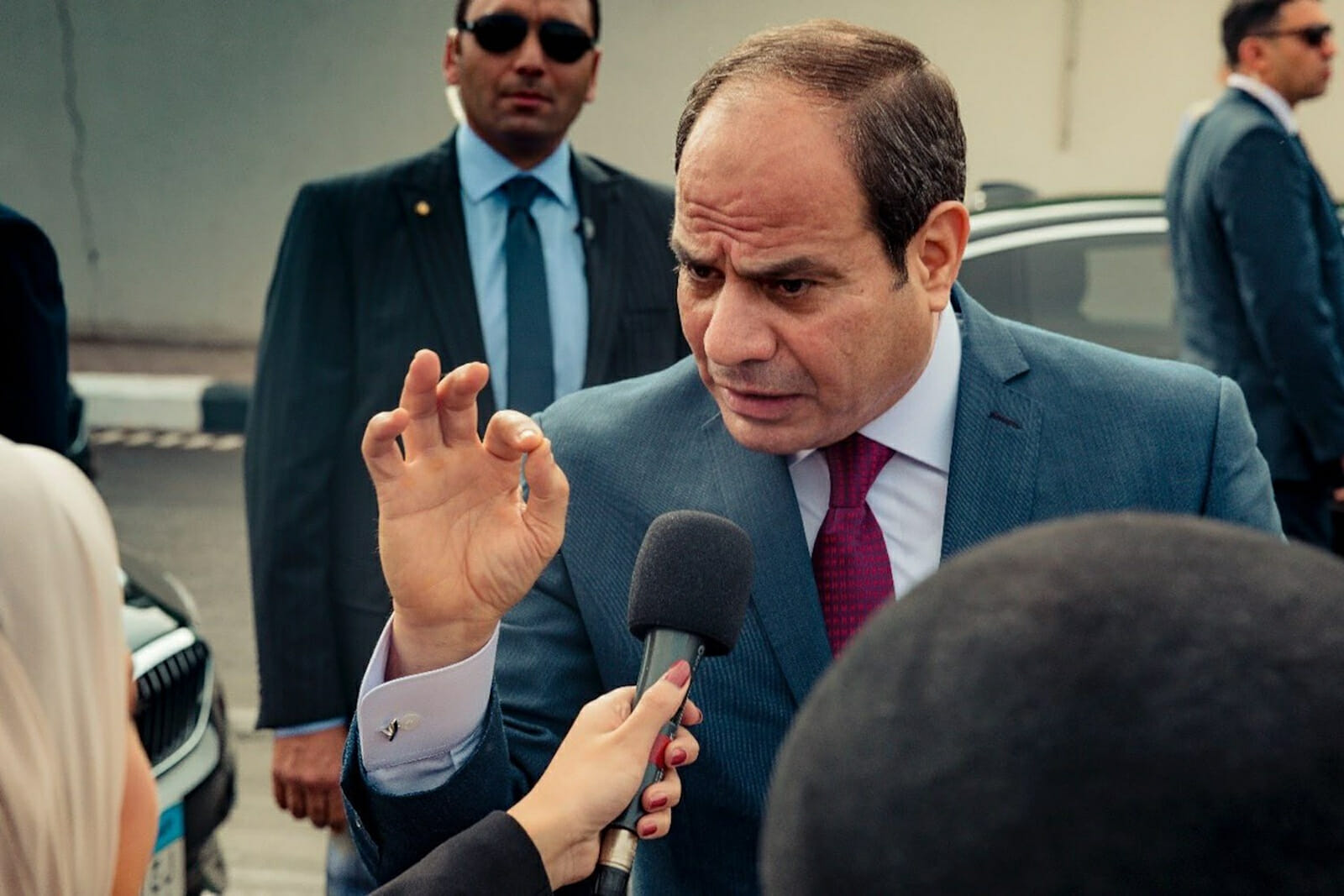
Facing up to Realism: Will Egypt Bomb the Dam?
In a public phone conference held last week, President Trump helped finalize a historic peace deal between Sudan and Israel. Notwithstanding the significance of this accomplishment, Mr. Trump chose to dilute its impact by foraying into an unrelated conflict—Egypt’s concerns over the Grand Ethiopian Renaissance Dam (GERD) on the Blue Nile. Speaking off-the-cuff, in characteristically boisterous form, Mr. Trump offered a seemingly startling prediction over the ongoing conflict: “[Egypt] will blow up that dam.”
Analysts and governments were left wondering, as usual, whether Mr. Trump’s statement reflected actual policy preferences. Some have warned that the statement reflected “dangerous rhetoric” surrounding the Nile conflict. Others have minimized the policy significance of the statement, characterizing it as an emotional outburst, rather than a realistic policy option. The statement has certainly made an impact on the ground. The Ethiopian government was quick to respond, summoning the U.S. ambassador and issuing a statement that the country would not cave into “aggressions” or “belligerent threats.” A former cabinet official in the Egyptian government interpreted President Trump’s statement as a “green light…for Egypt to strike the Renaissance Dam.” And while the president’s remarks are unlikely to tip the margins of the Nile conflict, they do force a realist assessment of the mechanisms that might lead to peace or war.
The Nile conflict
The Grand Ethiopian Renaissance Dam (GERD) is a hydroelectric infrastructure project on the Blue Nile, the main tributary of the Nile River, supplying 86% of the river’s streamflow. The GERD has a power generation capacity of 5,150 megawatts of power, enough to address critical energy gaps in Ethiopia and also generate export revenue from neighboring partners. The GERD has been a main pillar of Ethiopia’s development plans, and the Ethiopian government insists that the project is apolitical. Egypt, on the other hand, fears that the filling of the dam could drastically reduce its water supply from the Nile, which it has relied on almost entirely for its water supply and agricultural needs. Successive Egyptian governments have long considered Ethiopia a strategic foe, vis-à-vis its competing interests in the Nile.
In 2010, WikiLeaks revealed that Hosni Mubarak’s government explored military action against Ethiopia to preempt any development projects on the Blue Nile. In 2013, Mohammed Morsi’s Muslim Brotherhood-led regime openly discussed bombing the dam and fermenting insurrection in Ethiopia. Abdel Fattah el-Sisi’s government has publicly taken a softer line on Ethiopia, but President Trump’s unfiltered comments illuminate Egypt’s continued perception of the GERD as a security threat.
Indeed, Sisi’s government eagerly called in the UN Security Council to help frame the Nile conflict as a security issue, only to force the Council to publicly demur rather than get involved. Ethiopia, on the other hand, has argued that the Security Council should have no jurisdiction over development projects. To that end, it has successfully enthroned the African Union as the setting for further negotiations. AU-led negotiations over the GERD have since been ongoing, but Egyptian insistence on a binding resolution, tying Ethiopia’s options on the operation of the dam, have been faced with continued objections. There is no realistic expectation of a quick resolution to this conflict, and the prospect of war has been ever-present, well before President Trump chose to blatantly opine on the matter.
The impetus for war
As early as 2001, the CIA predicted that water conflicts would constitute a significant challenge to international security in the coming decades, singling out the politics over the Nile as one of the most likely hotspots for water wars. While phrased in dangerous terms, President Trump’s comments thus do not indicate a vast departure from previous predictions over the Nile conflict. Still, the urgency of Mr. Trump’s rhetoric and the reactions on the ground necessitate a reassessment of the actual possibilities of a new major war in Northeast Africa. Although Ethiopia continues to insist that the GERD is a development project, there is no denying the politics underlying the Nile. Egypt asserts its ‘historic use’ rights based on colonial-era treaties granting it monopoly over the Nile. As a result, Egypt interprets any threat to this hegemonic status quo as a security threat. The Nile conflict has effectively been constituted as a security dilemma. Although Egyptian military power dwarfs that of Ethiopia, relative military power is by no means the sole consideration in effective statecraft. Rather, analysis of the Nile conflict, in this case, requires an understanding of the dynamics that may influence the security dilemma.
According to realists, security dilemmas exist when rational choice calculations between two competing states result in sub-optimal expectations about the prospects of cooperation. In a security dilemma, the likelihood of war increases when offensive and defensive state actions are indistinguishable, and when the offensive party enjoys a relative advantage. In the case of the Nile conflict, one of these scenarios is clearly present. Because Egypt has interpreted the entire GERD project as a security threat, it is hard to determine whether its regional policies indicate defensive or offensive posturing. For instance, Ethiopia voiced stringent objections earlier this year, when plans for a new Egyptian military base in Somaliland were revealed. Such actions demonstrate a clear offensive intent, as Somalia neighbors Ethiopia, and could conceivably be used as a base for military invasion. Egypt has also been aggressive in pursuing regional integration initiatives to the exclusion of Ethiopia, such as the construction of a new continental rail network connecting Sudan, Egypt, and South Africa. By excluding Ethiopia, a major regional power, from such trade networks, Egypt is mustering the economic influence to counter Ethiopia’s emerging capabilities as a regional power hub. Such actions may be interpreted as either defensive or offensive posturing, but it is hard to tell whether Egypt’s underlying intention is to isolate Ethiopia preemptively, or simply prevent potential abuses of the Nile waters.
For its part, the Ethiopian government has been consistent in its defensive messaging over the Nile conflict. In a parliamentary address last year, the Ethiopian prime minister warned that it was ready to “mobilize millions” if faced with aggression from Egypt. In May of this year, Ethiopia installed anti-aircraft missiles to protect the GERD. Just this month, Ethiopia followed up by declaring a no-fly zone around the area, possibly anticipating Egyptian reconnaissance drones over the dam. It was also reported that Israel had supplied the Spyder-MR missile defense system to help arm the GERD, a claim that was fervently denied by the Israeli government. It is telling in this regard that Prime Minister Benjamin Netanyahu responded so awkwardly in the phone call with President Trump when the latter suggested that Egypt might bomb the GERD. In any case, the defensive messaging employed by the Ethiopian government has thus far not convinced Egypt that Ethiopia bears no ill intention towards its neighbor.
Solving the security dilemma
Security dilemmas are most potent and dangerous when the offensive and defensive intentions of rival parties can not be clearly distinguished, and when offense has the advantage. In the Nile conflict, Egypt and Ethiopia have used diplomacy, as well as their relative economic might, to undermine each others’ strategic positions with regards to the Nile. It is telling that the Ethiopian government initially funded the GERD through local bonds since Egypt successfully lobbied the World Bank and other financiers to steer clear of supporting the dam. Given these past dynamics, there is no means of determining whether Egypt’s present actions indicate offensive or defensive intent. Thus, the Nile conflict now meets one of the two main variables that escalate conditions of war in security dilemmas.
However, thus far, Ethiopia enjoys a slight defensive advantage over the GERD. Despite Egypt’s superior military capabilities, there are three dynamics that make it difficult for Egypt to simply ‘blow up’ the GERD. First, the Ethiopian government has employed strategic defensive capabilities to protect the dam, while publicly committing to a diplomatic solution. Second, Egypt has to contend with the diplomatic and geopolitical implications of a strike on the dam. A massive explosion over the dam could result in structural damages that permanently remake the entire streamflow of the Nile River. At the very least, destroying the dam would likely result in massive flooding that is sure to result in the loss of lives in neighboring Sudan.
The Eritrean government is another factor that is difficult to account for in this regional conflict. Eritrea’s president has previously indicated his belief that the GERD was a purely political project, but relations between Eritrea and Ethiopia have since warmed considerably. This month, Eritrea’s president visited the site of the GERD at Ethiopian Prime Minister Abiy Ahmed’s invitation, accentuating the increasing ties between the two countries. In short, it is not clear that Ethiopia’s neighbors would take kindly to an Egyptian military assault on the GERD. These regional diplomatic and military dynamics accentuate Ethiopia’s defensive advantage, reducing the chances of war in the Nile conflict.
However, the prospect of water wars over the Nile will continue to be raised so long as negotiations between Egypt and Ethiopia continue to stall, and so long as Egypt pursues ambiguous strategic posturing with regards to its neighbor. From the perspective of outside observers, it is possible that Egypt is simply positioning itself to strike in the event that its water and food security is significantly affected. On the other hand, it is equally possible that Egypt prefers a more offensive strategic positioning, and plans to strike the GERD preemptively.
Since states rarely project their true preferences in negotiations over security dilemmas, policymakers are left discerning signals. One misinterpretation or one strategic miscalculation by either party could lead to war. In this scenario, there are two options that may alter the calculus for these two parties and reorient the Nile conflict towards more cooperative grounds.
First, Egypt may reorient its strategic posturing towards clearly defensive territory, continuing to assert its right to water security, but without threatening its less economically endowed neighbor. For instance, Egypt may offer technical assistance, sharing its experiences and water filling statistics from the Aswan Dam. In this scenario, Egypt strategically repositions itself from an adversary to a stakeholder, completely negating the risks of war, and assuming greater agency in the operation of the dam. However, given the decades-long fermenting of rivalry between the two parties, this is not a likely undertaking. Furthermore, Egyptian negotiators have refused, on principle, to include any provisions on mutual data sharing in a potential agreement.
Assuming that the Egyptian government continues to exercise rationality and reason then, the only alternative for making peace over the Nile conflict is to greatly increase the costs of war. This responsibility lies squarely with the Ethiopian government. Egypt will be less likely to attack the dam as the projected costs of doing so increase. Thus, the prospects of peace in this conflict depend on the Ethiopian government’s ability to clearly demonstrate defensive capabilities around the dam, and to harness widespread diplomatic consensus against any military action on the GERD.

